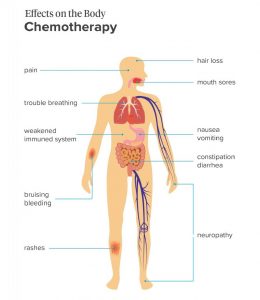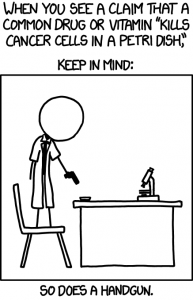Unfortunately, even at the time of publishing this article, many people around the world are battling cancer in a fight for their lives. For these people and their loved ones, receiving efficacious cancer treatment is of the utmost priority. It is currently estimated that close to 1 in 2 Canadians will end up developing cancer, and about 1 in 4 Canadians are expected to die as a result of cancer.
Evolution of cancer therapy
Cancer therapy has come a long way, but getting to where we are today would not be possible without the research that started 40 to 50 years ago. In the podcast below Dr. Chris Orvig, a researcher and professor at the University of British Columbia, describes how cancer therapy has evolved over the years and how it has become what it is today.
Concerns of current cancer therapy
Currently, most cancer treatments revolve around chemotherapy, which aims to destroy cancer cells. However, chemotherapy also results in the damage of non-cancerous cells within the body, which causes a host of side effects. The result of this subpar cellular targeting is that patients often experience debilitating side effects such as hair loss, organ damage, and reduction in memory and cognitive ability, just to name a few.

Common side effects of cancer on the body. (Medical News Today)
Targeted Alpha Therapy: A better alternative
In the hopes of finding a more effective cancer treatment with minimal toxic effects, Dr. Orvig and his team of researchers set out to find a viable alternative. In their study published in March 2020, they aimed to determine the effectiveness of targeted alpha therapy, a relatively new form of cancer therapy, using a radioactive metal isotope (actinium-225) and a binding agent for the metal (H4py4pa).
To gain a better understanding of how this mechanism works, the video below has Dr. Chris Orvig going through some of the chemistry behind targeted alpha therapy.
Dr. Chris Orvig and his team found that actinium-225 and H4py4pa are very compatible—in fact, even more compatible than they had hypothesized. Therefore, by coupling actinium-225 and H4py4pa, they were able to have great localization when targeting the cancer cells. However, more research is necessary to confirm the effectiveness of this treatment even though recent trials offer promising results.
Looking forward
Around the world, researchers like Dr. Orvig are constantly working on advancing our understanding of cancer and cancer therapy through novel and innovative solutions. Targeted alpha therapy has become an emerging therapeutic option for cancer patients, and leaves future scientists with many possibilities to develop and expand upon the topic. Currently, there is a lack of effective cancer treatments that result in minimal side effects. As scientists continue to investigate and understand the complex nature of cancer, hope is the sustaining force in this inquiry.
Written by Alessandra Liu, Harman Sandhu, Mehdi Mesbahnejad, Tae Hyung Kim

